#treaty of versailles WWI
Text
Treaty of Versailles
#WWI, #TreatyofVersailles, #worldWar1
The Treaty of Versailles – Warpedia
The Treaty of Versailles, signed on June 28, 1919, marked the official end of World War I and aimed to establish a lasting peace. However, its terms and consequences would shape the course of history, setting the stage for future conflicts. This blog post delves into the events leading up to the treaty, for example its key provisions, and the impact it had on…
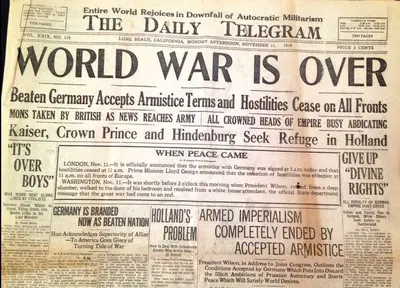
View On WordPress
#Treaty of Versailles#treaty of versailles terms#treaty of versailles ww1#treaty of versailles ww2#treaty of versailles WWI#warpedia#warpedia.net#world war 1#ww2
0 notes
Text

I was trying to get him to guess the Treaty of Versailles
#never not describing the treaty of versailles as “like a big headache” ever again#ww1#ww2#wwi#wwii#germany#treaty of versailles#history#akinator
7 notes
·
View notes
Text
i listen to history podcasts as though i can change what happened if i leave enough swear words in historical figure’s voicemails
“hindenburg. hindenburg, listen to me- HINDENBURG, YOU WHORE, DO NOT MAKE HIM CHANCELLOR HE WILL NOT WORK WITH YOU PEACEFULLY”
“wilson you absolute fucker what have you done with the peace points. wilson you were gonna build a new world - wilson how the fuck do you have airpods in did you seriously get all those reparations just to buy airpods”
“shove that espionage job up your own fucking arse don’t give it to the toothbrush - oh for fucks sake. you’ve ruined a perfectly good workers party is what you’ve done. look at it! it has a dictator!!”
“listen, nicky, i know you want to help your people but please just stay in your fucking room you don’t know shit about running an army. nicky go back inside and take off the fucking general badge”
“MATTHEW FUCKING PERRY I WILL SHOOT YOU IN THE FACE JUST DIE”
“hey nicky it’s me again. look i just think you should be focusing on how much he reeks instead of how he ‘healed’ your son, he smells like a goat that shat itself… you know he actually might be a goat. check his ears”
“mr archduke sir i respect your compassion for your soldiers. you’re an honourable man. tell your chauffeur to go around the block instead of doing a three point turn thanks i love you bye”
#it isn’t working they’re all making the worst decisions 😭#the noiser real dictators podcasts are rly good tho. they’re free if you can ignore the ads for cryptocurrency#history#is that?? is that a tag?? look man idk what’s going on#i actually rooted for ludendorff and hindenburg in wwi like they were just an iconic duo#then i googled what they did the rest of their lives#and i shut the fuck up#also every time someone mentions the treaty of versailles i start flipping off my screen? ESPECIALLY the war guilt clause#don’t get me started on the war fucking guilt clause#anyway have a good day lmao God bless
3 notes
·
View notes
Text
Paris peace treaties
Wilson's 14 points:
1. abolition of secret diplomacy
2. free navigation at sea for all nations in war and peace
3. removal of economic barriers between states
4. all-round reduction in armaments
5. impartial adjustment of colonial claims in the interests of the populations concerned
6. evacuation of Russian territory
7. restoration of Belgium
8. liberation of France and restoration of Alsace and Lorraine
9. readjustment of Italian frontiers along the lines of nationality
10. self-government for the people of Austria-Hungary
11. Romania, Serbia, and Montenegro to be evacuated and Serbia given access to the sea
12. self-government for the non-Turkish peoples of the Turkish Empire and permanent opening of the Dardanelles.
13. an independent Poland with secure access to the sea
14. a general association of nations to preserve peace
The aims:
FRANCE - Clemenceau
Wanted a HARSH peace that would ruin Germany both economically and militarily so that it could never again threaten French borders.
BRITAIN - Lloyd George
In favour of a less severe settlement that would enable a quick German recovery so that trade could resume. However, Lloyd George had just won an election with slogans such as 'Hang the Kaiser', so the British public expected a harsher settlement.
THE USA - Woodrow Wilson (Jesus-complexed)
In favour of a lenient peace, though he was very disappointed that the Germans had ignored the 14 points when imposing the Treaty of Bretsk-Litovck. He had to accept British and French demands for reparations and German disarmament, but was able to limit the reparations to losses to civilians and their property, instead of 'the whole cost of the war'. He was also in favor of self-determination wherein a nation should be freed from foreign rule and given democratic governments of their own choice.
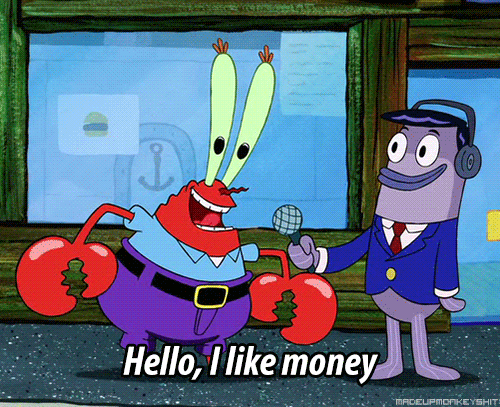
The treaties:
VERSAILLES - Germany
Fixed the war guilt solely on Germany and its allies (see short-term causes of wwi)
- 10% of its land was removed and redistributed including:
Alsace-Lorraine to France
West Prussia, Posen and Silesia to Poland
Eupen, Malmedy and Moresnet to Belgium
Northern Schleswig to Denmark
Hultschin to Czechoslovakia
Danzig and the Saarland became mandates of the League of Nations
All colonies were lost.
Reparations were set at 132 billion gold marks/£6,600 million.
The army was reduced to 100,000 men
No air force, no tanks, no artillery
12 torpedo boats and no submarines
Rhineland became a demilitarised zone (to increase the security of France, Belgium, and the Netherlands against future German aggression.
Forbidden to unite with Austria

THE GERMAN RESPONSEThey objected on the grounds that they were not allowed into the discussions at Versailles as they were instead presented with the terms and told to sign. Not signing would continue the war. Complaints were heard and promptly ignored.
Perspective: Germans were justified in objecting and it would have been reasonable to let them join the discussion, and would have deprived the argument used by Hitler that the treaty was a 'diktat' and therefore should not be morally binding.
Counterperspective: Germans shouldn't have expected any better treatment after the harsh way they treated the Russians in the Treaty of Bretsk-Litovsk.
The Germans complained that they had been promised terms based on Wilson's 14 points and that many of the provisions were not based on them at all - a swindle. Not very valid as the 14 points had never been accepted as official by any of the states involved.
Germany had ignored them when they still had a chance of victory in January 1918 and since then, Allied attitude towards Germany had hardened (Bretsk-Litovsk, the destruction of mines, factories and public buildings during their retreat through France and Belgium) and led to the addition of two points: Germany should pay for the damage to civilian populations and property, and should be disarmed - all of which they were aware when accepting the armistice. Most terms actually complied....
Germany also complained about the loss of territory in Europe, specifically Upper Silesia, which they ultimately were allowed to keep 2/3 of. They also complained about their colonies that were made into mandates under Britain and France - annexing without admitting they were annexing...
The Germans complained that 100,000 troops were insufficient to keep law and order at a time of civil unrest. As none of the other powers intended to disarm later (despite 'all-round reduction of armaments' being specified in the 14 points), the Germans became further aggrieved.
The Germans objected to being saddled with the entire blame for the outbreak of war. Reached the conclusion in 6 weeks. The Allies wanted the Germans to admit responsibility so that they would be liable to pay reparations.

The final humiliation: the reparations. Many historians now agree that the amount was too high at £6,600 million/132 billion gold marks.
John Meynard Keynes (present as economic adviser to the British delegation) urged the Allies to take £2,000 million, a more reasonable amount that Germany would be able to afford.
The Germans protested that it was impossible to pay, and soon began to default on their annual instalments, causing resentment among the Allies who relied on German cash to help pay their war debts to the USA. Eventually, the Allies realised their mistake and reduced the amount to £2,000 million in The Young plan in 1929, but at this point the reparations had disastrous consequences economically and politically. BUT it could have been worse if Clemenseau had had his way and made the Rhineland an independent state and annexing the Saar.
No one in Germany was happy about the terms but the Allies threatened the Germans with military invasion to get them to sign the treaty. After four years of war and sacrifive, German citizens felt humiliated to accept blame for the war and territorial loss.
Gerhard Weinberg: The 'justice' of the Treaty of Versailles as a source of European discord is irrelevant. The vast majority of Germans in the interwar period believed that their country had actually won wwi, decisively defeating the USA, but that the Reich was defeated by the 'stab-in-the-back' that was the November revolution of 1918 at the moment of victory. Favourable terms would still be challenged. The harshness of the terms have been exaggerated as Germany lost even more to Poland after wwii: Oder-Neisse... (I feel like maybe the partition of Germany had something to do with that though....)
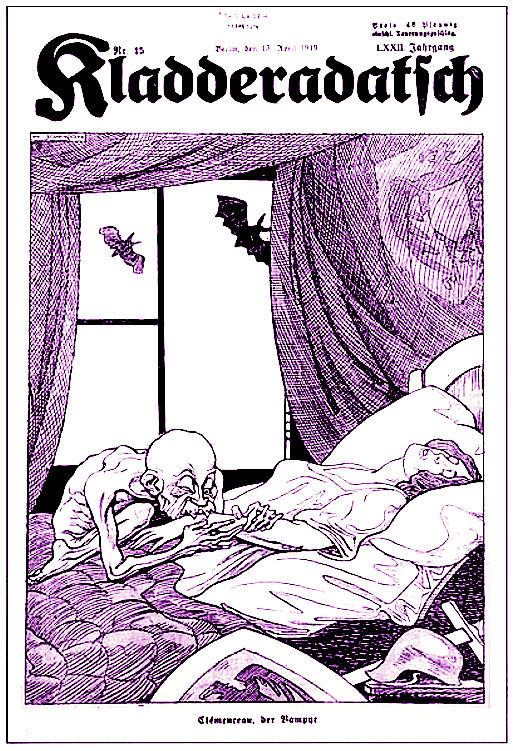
ST. GERMAIN - Austria
Lost land including:
Bohemia and Moravia to Czechoslovakia
Bosnia-Herzegovina and Croatia to Yugoslavia
Bukovina to Romania
Galicia to Poland
The Tyrol, Trieste, Istria to Italy (As promised in the Treaty of London)
Before a reparations figure was set, Austria went bankrupt...
Army reduced to 30,000 men
No air force
No navy
THE AUSTRIAN RESPONSE
Austrian officials protested the violation of the principle of self-determination, the placement of so many ethnic Germans under Czechoslovak and Italian rule, and the forbiddance of unity with Germany.
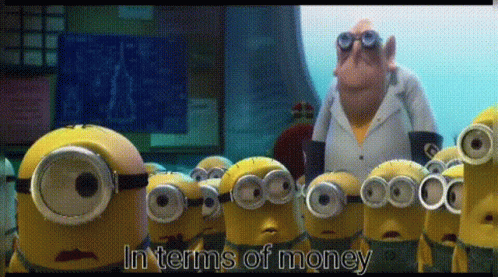
TRIANON - Hungary
Lost over two-thirds of its territory and 64% of its pre-war population including:
Transylvania to Romania
Slovakia, Ruthenia to Czechoslovakia
Slovenia and Croatia to Yugoslavia
Reparations set at 200 million gold crowns (payment suspended due to Hungary's financial difficulties)
Army reduced to 35,000 men
No air force, no tanks, no submarines.
THE HUNGARIAN RESPONSE
Hungarian officials(, like the Austrians,) opposed the displacement of so many ethnic Magyars, especially without plebiscites, in violation of the principle of self-determination. They also opposed the Treaty's violation of Hungary's historical character.
NEUILLY - Bulgaria
Various lands lost to Greece, Romania and Yugoslavia (thereby losing access to the Mediterranean sea)
Reparations set at £100 million (75% of which were later remitted)
Army reduced to 20,000 men
No air force
Navy reduced to four torpedo boats, six motor boats and no submarines
THE BULGARIAN RESPONSE
The Bulgarian people were outraged when they learned of the terms of the Treaty but were not in a position to do anything about it. When wwii broke out, Bulgaria sided with Nazi Germany and reclaimed all the lost land - bitterness it seems.
SEVRES - breaks up the Ottoman empire - Turkey
Lost land including:
South-western Anatolia to Italy
Western Anatolia to create Kurdish and Armenian states
Smyrna and Eatern Thrace to Greece
Middle Eastern possessions became mandates under the control of Britain and France.
Reparations=none
Army reduced to 50,000 men
No air force, tanks or submarines
THE TURKISH RESPONSE
Ataturk (father of Turks) rejected the treaty and forced the Europeans back to the negotiating table and was thus able to secure more favourable terms in The Treaty of Lausanne
LAUSANNE - Turkey
Recognised the Republic of Turkey as the successor state of the Ottoman Empire. The Allies dropped their demands of autonomy for Turkish Kurdistand and Turkish cession of territory to Armenia, abandoned cliams to spheres of influence in Turkey, and imposed no controls over Turkey's finances or armed forces. The Turkish straits between the Aegean Sea and the Black Sea were declared open to all shipping.
3 notes
·
View notes
Text
I recently had a family event and it reminded me why I'm the most insufferable person to talk wwii with. It's literally just
Sb: Asks a basic question about the why's and how's
Me, pulling out dozens of books written by dusty old men: To understand WWII we must first examine the Crimean War...
#and on the topic of the crimean war...#I once did a project on the Treaty of Versailles and when I told my teacher I planned on starting my research with the build up to WWI#he told me that he would give me one hint and it was “Crimean War”#thus began the most hair pulling weeks of my 12 year old life#as I discovered the Crimean War was on its own#a nothing war#done by European countries who were very much not prepared for war#but it was a good starting point in researching the aggression and territorial disputes#at least for a middle school project
5 notes
·
View notes
Text
youtube
Ten Big Myths of World War I
#history#wwi#remembrance day#pay particular attention myths 9&10#the point of war is to achieve political aims through violence#and#the Treaty of Versailles wasn't really all that harsh as these things go#the treaty of Brest-Litovsk on the other hand...#personally I think the Germans knew that they had lost but they couldn't bring themselves to admit it#so they developed this victim complex#Youtube#History Hits#Dan Snow
0 notes
Text
I'm reading Woodrow Wilson's 14 Points for a paper I'm writing and wow. So much trouble could've been avoided if England and France actually listened and went with it
#woodrow wilson#14 points#world war 1#world war i#world war one#ww1#wwi#school#fuck school#essay#paper#school paper#essays#school papers#homework#treaty of versailles#versailles#history#history class
1 note
·
View note
Quote
Hitler’s sales pitch to the German people was grounded in the idea that average German working people were victims and Hitler was their champion.
He claimed Jews, homosexuals, and socialists had “stabbed Germany in the back” by participating in negotiations for the Treaty of Versailles that imposed punitive conditions on the country, producing widespread poverty and an economic crisis.
If the German people were victims, Hitler told them, the villains were German minorities, promoting degeneracy like jazz and swing music, tolerance of homosexuality and transgender people, and the “international Jewish conspiracy.”
Once the Nazis took power they banned books, outlawed drag shows and homosexuality, changed school curricula to remove mention of their atrocities in WWI, and rewrote election laws so they’d never again lose an election.
What’s Behind the GOP’s War Against Democracy?
Sounds familiar, doesn’t it?
2K notes
·
View notes
Text
can’t stop thinking about the thought of Yao and Kiku at Versailles in 1919 after WWI and the Hall of Mirrors and the symbolism of it all 😔The sheer resentment on Yao’s part over the Japanese territorial claim to Shandong in the Versailles Treaty, the superiority-inferiority complex radiated by Kiku, undeniably triumphant over Yao but very keenly aware that the Western powers do not regard him a real equal all the same. I think what gets me is how I see them: the thought of these two old nations who have such a long history together having a furious face off—with their once long hair both cropped short in the western style, both in western clothing instead of the hanfu or changshan or kimono they’ve worn for centuries, in the opulent surroundings of the Palace of Versailles—one of the grandest examples of Western architecture. And probably arguing in English, not Mandarin Chinese or Japanese, because neither will ever countenance using the other’s language at this fraught point in history. Yao will never recognise Kiku’s power, and Kiku will never deign to lose face by speaking the language of his mentor (and rival) who has lost all his prestige and thus, any respect he might’ve once deserved.
Mirrors too are an old element with meaning in both Chinese and Japanese culture, and both Yao and Kiku are no strangers to palaces— but the Hall of Mirrors is utterly Western in its baroque grandiosity and impressiveness and artistry. It’s like on one hand, Sino-Japanese conflict is far older than the rise of/very existence of several of these Western powers, and so this is a familiar and incredibly old dynamic in some ways. But at the same time, this whole set up is alien and unfamiliar and while Kiku absolutely has the upper hand, they are both utterly out of their natural element too. As befits how Japanese and Chinese adoption of Westernisation in the 19th-20th centuries was hardly motivated by an indulgent admiration of Western ways, but absolutely driven by a sense of mortal danger to their political autonomy from western empires, if they didn’t adapt to what was now the centre of world power.
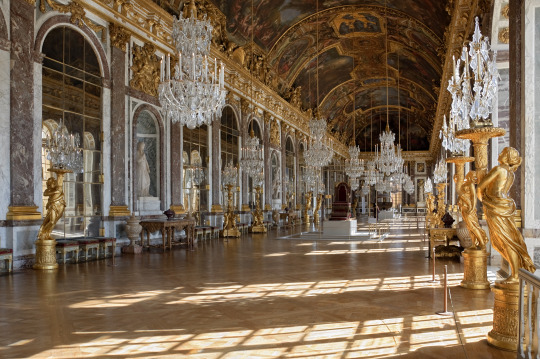
#hetalia#hws china#hws Japan#wang yao#honda kiku#hetalia headcanons#I just have a lot of thoughts!!!! about this moment in history
172 notes
·
View notes
Photo

The Causes of WWII
The origins of the Second World War (1939-45) may be traced back to the harsh peace settlement of the First World War (1914-18) and the economic crisis of the 1930s, while more immediate causes were the aggressive invasions of their neighbours by Germany, Italy, and Japan. A weak and divided Europe, an isolationist USA, and an opportunistic USSR were all intent on peace, but the policy of appeasement only delivered what everyone most feared: another long and terrible world war.
The main causes of WWII were:
The harsh Treaty of Versailles
The economic crisis of the 1930s
The rise of fascism
Germany's rearmament
The cult of Adolf Hitler
The policy of appeasement by Western powers
Treaties of mutual interest between Axis Powers
Lack of treaties between the Allies
The territorial expansion of Germany, Italy, and Japan
The Nazi-Soviet Pact
The invasion of Poland in September 1939
The Japanese attack on the US naval base at Pearl Harbour
Treaty of Versailles
Germany was defeated in the First World War, and the victors established harsh terms to ensure that some of the costs of the war were recuperated and to prevent Germany from becoming a future threat. With European economies and populations greatly damaged by the war, the victors were in no mood to be lenient since Germany had almost won and its industry was still intact. Germany remained a dangerous state. However, Britain and France did not want a totally punitive settlement, as this might lead to lasting resentment and make Germany unable to become a valuable market for exports.
The peace terms were set out in the Treaty of Versailles, signed by all parties except the USSR on 28 June 1919. The Rhineland must be demilitarised to act as a buffer zone between Germany and France. All colonies and the Saar, a coal-rich area of western Germany, were removed from German authority. Poland was given the industrial area of Upper Silesia and a corridor to the sea, which included Danzig (Gdánsk) and cut off East Prussia from the rest of Germany. France regained the regions of Alsace and Lorraine. Germany had to pay war reparations to France and Belgium. Germany had limits on its armed forces and could not build tanks, aircraft, submarines, or battleships. Finally, Germany was to accept complete responsibility, that is the guilt, for starting the war. Many Germans viewed the peace terms as highly dishonourable.
The settlement established nine new countries in Eastern Europe, a recipe for instability since all of them disputed their borders, and many contained large minority groups who claimed to be part of another country. Germany, Italy, and Russia, once powerful again after the heavy costs of WWI, looked upon these fledgling states with imperialist envy.
In the 1920s, Germany signed two important treaties. The Locarno Treaty of 1925 guaranteed Germany's western borders but allowed some scope for change in the east. The 1928 Kellogg-Briand Pact was signed by 56 countries. All the major powers promised not to conduct foreign policy using military means. In 1929, Germany's reparations as stipulated by the Treaty of Versailles were reduced from £6.6 million to £2 million. In 1932, the reparations were cancelled altogether. This was all very promising, but through the 1930s, the complex web of European diplomacy began to quickly unravel in a climate of economic decline.
Continue reading...
36 notes
·
View notes
Text
Okay, so, I just got an ask in my inbox from someone bitching at me for "defending" Erwin Rommel, the German general from WWII that some people think Erwin is based on or inspired by. They said "I can't believe you would defend Erwin Rommel because of a mid anime. He turned against Hitler in 1944 because the war was turning, not because he was against Fascism". Needless to say, I'm not going to play into this morons game by actually directly answering them, but I do want to make a point which is important to understand.
Because here's the thing that idiots like this don't get. The morons like this, that want to accuse AoT of being antisemitic, Fascist propaganda, they say all this shit while laboring under the belief that the Eldian's are "meant to be Jews", and because they can turn into Titans, Isayama was making some nefarious insinuation that Jews are actually monsters.
This is so stupid, it shouldn't even need to be addressed, but I will anyway, because some fuckers need to get their heads out of their assess.
First of all, nothing in AoT is meant to be a direct or 1 to 1 allegory of anything. It's an amalgamation of different historical events all meshed together. Second of all, none of these people seem to want to acknowledge that the closest group the Eldian's resemble, in reality, are the Germans, not Jews. It doesn't even make sense for Eldian's to be seen as Jewish, or as a stand in for Jews, because everything about them, from their history, to their names, to their culture and architecture and religious beliefs, resembles German and Germanic culture and history, including the German's historically warmongering ways. Remember, the Eldian's started off as a warring, Viking-like tribe of people who went around conquering other tribes of people. And the arc of the Yeagerist's eventually coming to power most resembles how the Nazi's eventually came to power, through the German people being horrifically oppressed and punished for the outbreak of WWI through the Treaties of Versailles, something we see reflected in how the Eldian's were eventually punished for their warmongering, cut off from the rest of the world, isolated and stolen from. Even if Erwin Smith is inspired by or based on Erwin Rommel, how does that in any way, shape or form indicate some Fascist or antisemitic agenda on Isayama's part, when Erwin Smith clearly isn't meant to be Jewish, but in every way resembles a German man? Let's suppose he is inspired by Rommel, again, it only supports the likelihood that the Eldian's are meant to be German, not Jews, and so the entire crux of these fucking moron's argument, that Isayama is being "antisemitic" because the Eldian's can turn into titans, completely falls apart, when the people that can turn into titans aren't meant to be seen as Jews, but clearly more obviously resemble Germans. Further, Erwin Smith is a fictional character. Just because he was inspired by a real-life historical figure doesn't mean he's meant to be that historical figure. While Erwin may share some superficial aspects with Rommel, Erwin is still a fictional character, and possesses multiple characteristics that differ immensely from Rommel in every way. People don't seem to understand that inspiration for a character or theme doesn't mean the character or theme is meant to be a direct representation of the thing that inspired it.
Further, one of the main themes of AoT is that we all have the capability to be monsters. Eldian's being able to turn into titans isn't meant to be seen as some sort of condemnation of their race. We aren't meant to hate them for this. The entire idea is that people, all people, can be monsters, their having some weird, magical ability to turn into titans having nothing to do with it. The Marleyans were just as monstrous as the Eldian's ever were in the way they treated people, in the things they did, in the agenda they pushed, and in their warmongering. They couldn't turn into titans, but they were every bit as bad, every bit as capable of evil. Again, the ability to turn into a titan isn't ever meant as any sort of statement as to the nature of the Eldian people. It's human nature itself that is framed as the real monster. It's also important to note that the Eldian's turning into titans wasn't ever something they wanted or which they chose to do. They were forced to turn into titans, either by the former rulers of the Eldian Empire, or by the Marleyan government, both of which utilized them as weapons against their wills. The Eldian people subjected to this were never meant to be seen as monsters, but as victims. We were always meant to feel sympathetic toward them for being used and forced against their wills to do something they had no say in or wish for. We see their persecution clearly framed as a bad thing, a very bad thing, which ultimately leads to tragedy and untold destruction and death. We see the prejudice against them clearly framed to be something wrong and evil, the very thing which ultimately leads to Marley's own demise. Again, if you want to make some sort of direct comparison to real, historical events, this all clearly resembles what happened with Germany and the rest of Europe after WWI, with the German people being convinced that they were being denied their god given destiny and right to exist through the extreme punishment exacted upon them by the rest of the world. Nazism and the National Socialist Party took hold because the German people felt deeply wronged and persecuted, which they were. The entire country was practically destroyed by the harsh sanctions and restrictions placed on it. The reaction from the German people in real life is something we see reflected in the Yeagerist's eventually coming to power and exacting their "revenge" on the rest of the world through their support of Eren. The Eldian's were, just like the German people, unduly punished and made to suffer for the wrongs of their past government and rulers, and eventually grew resentful and longing for the days when they saw themselves as glorious and powerful. We see this reflected earlier on in the story with Grisha Yeager's extremism and his belief that the Eldian empire should be restored, etc... His and the Yeagerists desire to take back what was once "theirs", spurred on by excessive punishment and cruelty and persecution from the rest of the world. This, again, all resembles Germany, and what happened with Germany following WWI, with the rise of Nazism and Hitler. How people can miss this is beyond me. They're so fucking stupid, and ignorant to boot. The rise of the Yagerists was never meant to be seen as a good thing. I don't care how many dumb fuck Yeagerists there are in the fandom, or how many morons try to make excuses for Eren's actions, the story plainly frames his actions and the Yeagerists taking over Paradis as a horrifically bad thing, one which leads to unspeakable tragedy and destruction, just like the rise of Nazism did in real life. Anyone who's read or watched AoT would know this. But then, I think most of the people that actually believe AoT is some sort of fascist, antisemitic propaganda haven't ever actually read or watched the manga or anime. If they did, assuming they have any, actual functioning brain cells, they would know how absurd and nonsensical such a belief is.
And once more, I reiterate, nothing in AoT is meant to be seen or taken as a direct or 1 to 1 allegory for any, real life historical event. Isayama was clearly inspired by multiple sources and multiple parts of history when he crafted his story. But it's still a work of original fiction, which is it's own thing, and which can't be taken as some sort of political or ideological statement on anything in real life. It's a self-contained work of art which, while it may have some resemblance to real life events, isn't and never was meant to be seen as an allegory for those events.
Anyway, that's all I'm going to say on this matter.
40 notes
·
View notes
Text
Why did World War I Start
#WWI #WorldWar1 #Warpedia
World War I – Warpedia
World War I, often referred to as the Great War, was a cataclysmic event that reshaped the course of history. To comprehend the reasons behind Why did World War I Start: We must delve into a complex web of political tensions, imperial ambitions, and a series of interconnected events. This blog post: aims to explore the key factors that contributed to the start of World War…
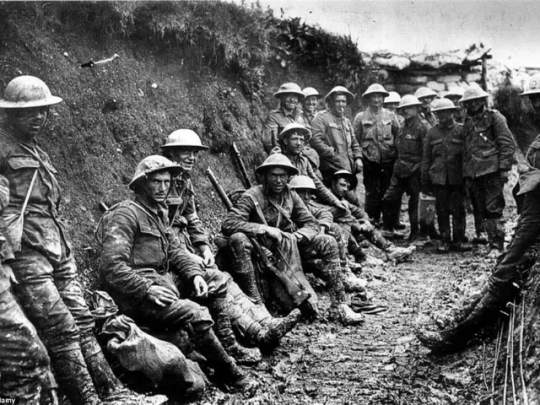
View On WordPress
#Allied powers#Battle of the Somme#Battle of Verdun#Great war#history#Treaty of Versailles#warpedia#who won world war 1#Why did World War I Start#world war 1 countries#WWi
0 notes
Text
I keep thinking about the Bad Touch Trio and how... Well how it doesn't really work historically.
I'm especially talking about Prussia and France. These two should fucking hate each other historically, down to their core. Like, the Franco-Prussian War ??? Hello ?? WWI and WWII ?? Holy shit these two would have some GREAT PATH to walk through to get along after that. Even reconciling with Germany would be easier.
I mean- sure they happened to be on the same side at some points in History, and there was the whole enlightenment era, but apart from that, the two would be at each other's throat, from the French Revolution to the Napoleonic wars, the 1870 war that ended up in France basically loosing all potential allies in Europe to the newly formed Germany and ending up a bit isolated in Europe for a while (Prussia probably jumping from joy when this happens), the World Wars, the Versailles Treaty, etc... If we go by the headcanon that Germany was born in 1871 and that Prussia was the pain figure who raised him, then France would have more than a simple beef with Prussia (more than Germany).
As for Spain... I know way less about Spain's diplomatic history, I don't know how his relationship could be with th two. Maybe there was some resentment from France that the Franco-Prussian war technically started in Spain ? Maybe, maybe not, I don't know.
Now if we do exclude historical fact, the trio does go well together with their personalities and all. The fandom really did a great job when making these three a believe and very fun trio. Unfortunately, my mind loves history too much and cannot get around the trio being functional at all.
I might go into the whole 1870s to 1914 era for the major European powers and how they would be interacting with each other because the era is so interesting in terms of foreign policies and strategies.
Historical Hetalia will be the end of me. :)
#bad touch trio#aph prussia#hws prussia#aph france#hws france#aph spain#hws spain#aph germany#hws germany#hetalia#mes blogs
190 notes
·
View notes
Note
How come poppies on the label for November 11th never became a thing in America? Also does the label poppies have anything to the poem "In Flanders Field" or simply a coincidence?
The U.S has a very different historical memory about WWI than European countries do, in that we barely remember that we fought in it. Yes, we observe the 11th, but it's quite notable that the U.S shifted from observing "Armistice Day" to observing "Veterans Day" as a Federal holiday honoring American veterans of all wars in 1954 - something that would have been utterly unthinkable in Britain or France or West Germany or Italy. American schools tend to give short shrift to WWI in history classes, there are very few WWI movies and TV shows (especially in comparison to the huge amount of media about WWII) made in the U.S for American audiences, and so forth.

Part of the reason for that is that the American narrative of the war was profoundly impacted by domestic impressions of the Treaty of Versailles and its political failure in the United States. The dominant narrative very soon after the war was that American soldiers had fought for the noblest of motives - making the world safe for democracy, a peace without victors, the Fourteen Points, self-determination of nations, and all that - and had been sold out by war profiteers and the same corrupt, lying colonialists who had started the war to begin with.
The other part was that U.S participation in the Great War was relatively brief and we managed to escape with relatively few casualties. The length and the scale of casualties endured by European nations, the culling of an entire generation, the reshaping of every society pretty much demanded mass participation in commemoration, whether people thought that the war had been a tragedy or a triumph. By contrast, the United States could more easily consign its involvement in WWI to the dustbin of history along with the rest of our "forgotten wars" in its headlong dash to "return to normalcy" in the 1920s.
35 notes
·
View notes
Text
The Nazis called it "self-defense" too
They had all this blah blah about "existentential struggle" and how "we need to claim habitat or our people will perish"
They too justified it with what they suffered in the past - WWI, versailles treaty, great depression and so forth
And they too took their anger out on defenseless people who had nothing to do with it (jews and poles)
Its the logic of every bully: "If miserable so I need to make someone more miserable than myself. My anger is sacred and rightheous, your anger is an excuse to brutalize you further"
If we dont speak up about it all this talk about "never again" I grew up with was hot air
20 notes
·
View notes
Note
Because you are my American Presidents MutualTM: I have been watching a British WWI documentary (The Great War, 1964) while crafting, and I was wondering what could you tell me about Woodrow Wilson and the war. The documentary itself seems conflicted about it.
I can't tell you too much, because my main area of interest is the pre-1900 presidents. I don't know much about Woodrow Wilson beyond what was in the Presidential episode and what little I vaguely remember from history class.
Glancing back over the transcript, it looks like he tried to stay out of the war for a long time, and then when it got too big to ignore, he pushed Congress into a declaration of war. The episode claims he's historically gotten a lot of guff for saying, "The world must be made safe for democracy," but they point out that in other places, he made it clear that he wasn't saying we should make it safe for democracy--he didn't believe in aggressive interference to force it on other nations.
Beyond that, I know he pushed really hard for America to ratify the Treaty of Versailles and join the League of Nations, and failed.
I don't know anything else about his actions during the war--either in avoiding or fighting it--unfortunately.
7 notes
·
View notes